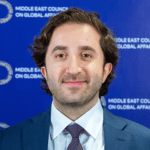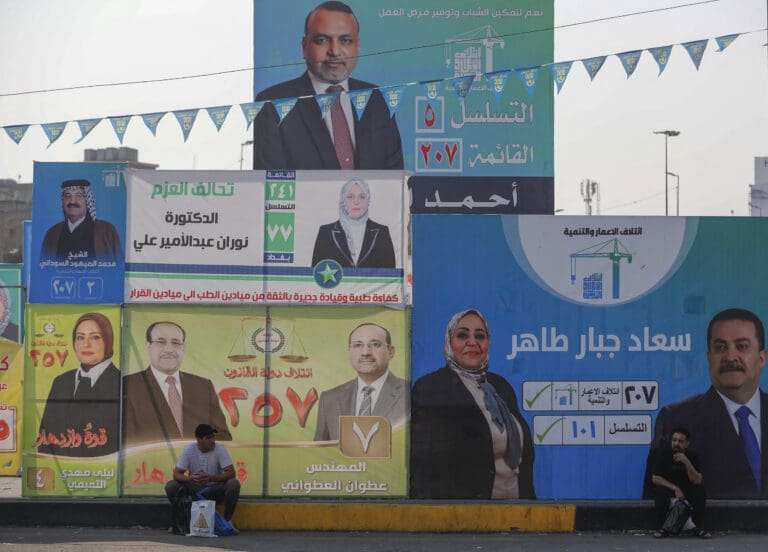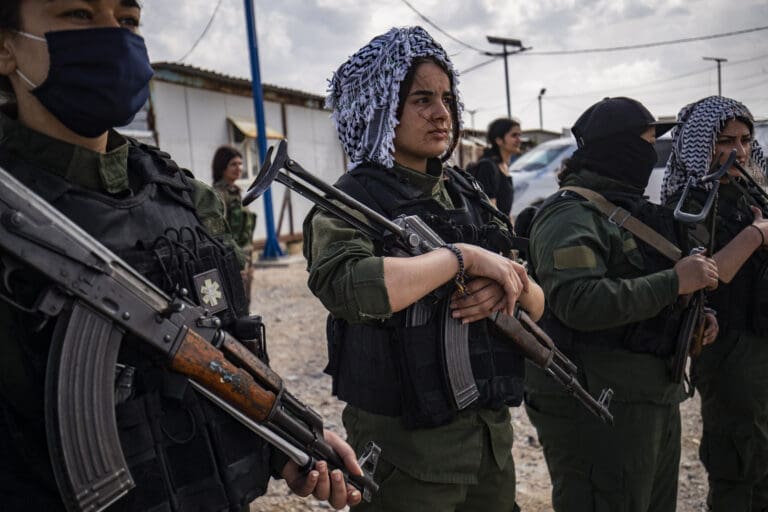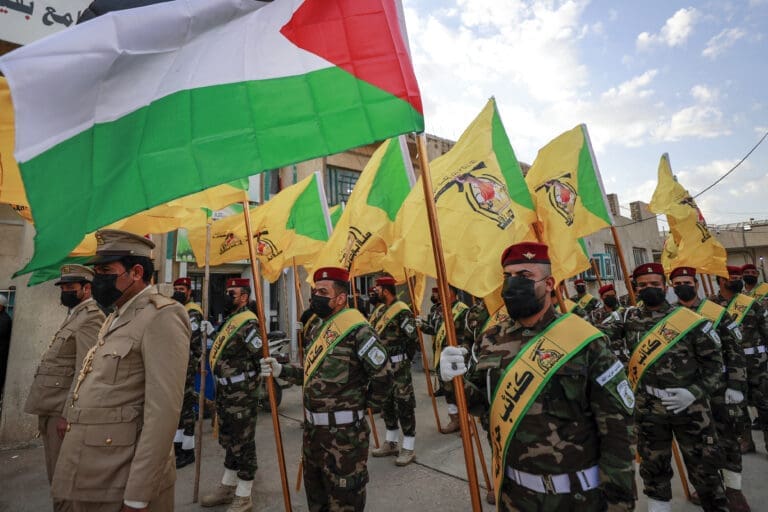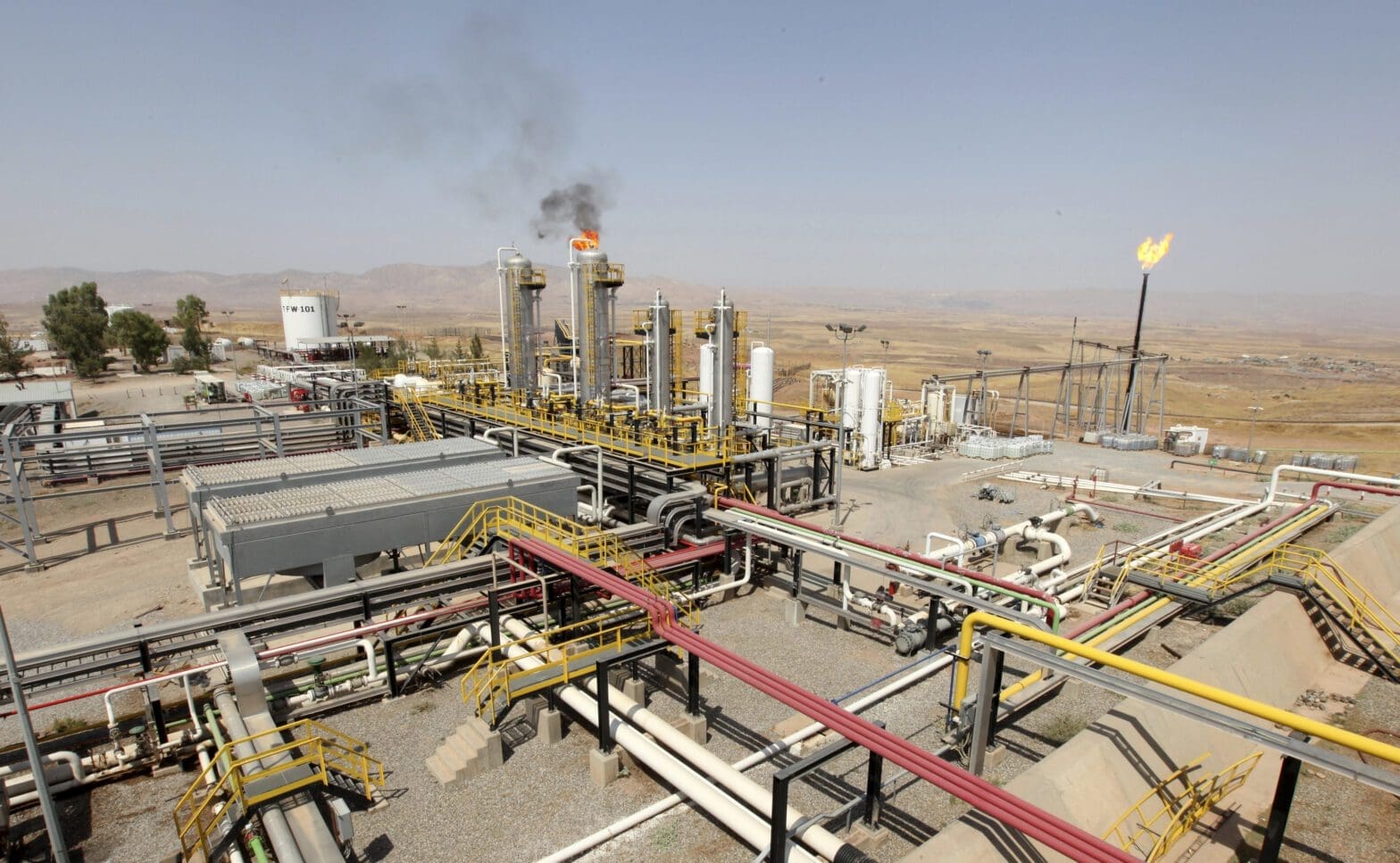
The Geopolitics of Iraqi Kurdistan’s Gas Reserves:
Challenges and Prospects
Issue Brief, April 2023
Key Takeaways
Realizing Iraqi Kurdistan’s Energy Potential: Iraqi Kurdistan’s gas reserves have the potential to significantly transform geopolitics. However, political divisions and disputes have complicated the process of realizing this potential.
Finding a Negotiated Settlement: Baghdad has traditionally leveraged its control of the energy sector, critical to the Kurdistan Regional Government’s (KRG) existence, to secure concessions in political disputes. However, both Iran and Iraq realize that Iran’s gas supplies are not sufficient for Iraq’s energy needs which heightens the importance of Kurdish gas reserves, and, therefore, raises the imperative of a compromise. The two ruling parties in Kurdistan must also unify their ranks to find a negotiated settlement if the KRG is to exploit its gas reserves.
Regional Dialogue Is Crucial to Managing Geopolitical Tensions: Kurdistan should work with Türkiye and the Gulf to create favorable geopolitical conditions. Regional dialogue and de-escalation initiatives can help mitigate Iran’s hostility to Kurdish gas exports.
Western Mediation Can Increase Prospects for Kurdish Gas Exports: The United States (U.S.), an active player in Kurdistan’s gas sector, together with Europe can mediate disputes in Iraq through backing regional dialogue on Kurdish gas exports. This will increase the prospect of securing alternative energy sources, namely Kurdish gas, amidst the war in Ukraine.
Introduction
The strategic relationship between Türkiye and the Kurdistan Regional Government (KRG) has developed substantially over the past two decades, including a historic decision in 2013 to build direct gas and oil pipelines without the approval of the federal government in Baghdad.1 The relationship has established a partnership that has had significant domestic and geopolitical reverberations. In relation to the former, the KRG is embroiled in a long-standing legal dispute with the federal government, which has hampered its capacity to develop its energy sector. In relation to the latter, Iraq raised, and partially won, an arbitration case against Türkiye because of the pipeline that allows independent Kurdish oil exports.2 That said, Türkiye long ago came to the conclusion that it can no longer be indifferent to the fact that Kurdistan presides over at least 25 trillion cubic feet (tcf) of proven gas reserves and up to 198 tcf of largely unproven gas.3 Türkiye has also drawn on its relationship with the KRG to enhance its influence in Iraq and leverage that relationship geopolitically, as a buffer against Iran and a conduit through which to influence other arenas, like the conflict in Syria. There are, therefore, numerous factors that can either enhance or impede the relationship in the energy sector.
In recent years, an additional dimension has been added to the Ankara-Erbil energy relationship. The KRG has increased outreach to Gulf countries, aspiring to draw on Gulf political support and financing of its gas reserves, and to augment its reach in Iraq and the wider region. This has aligned Erbil with Ankara’s hopes of becoming an energy hub, with Kurdish gas reserves being central to this objective, given the vast gas reserves possessed by the KRG and the investments Türkiye has made in its relationship with the KRG and its partners in Iraq.4 Gulf countries could be critical for garnering regional and global support for Erbil amidst Western hunger for alternative gas sources as the war in Ukraine continues.5 But there are substantial challenges— internal Kurdish political divisions, Baghdad’s pushback against Kurdish energy exports, and the risk of Iranian escalatory measures against the KRG and the Gulf Cooperation Council (GCC) countries.
This issue brief explores these challenges and argues that the KRG must walk before it can run as it develops its gas infrastructure, which requires consensus between the KRG and Baghdad, and addressing internal political fractures. Türkiye, the GCC countries, Iran, and the West should form a collective effort to ground Kurdish gas exports in regional dialogue and de-escalation discussions which can alleviate Iranian apprehensions and secure much-needed gas supplies for Iraq’s domestic consumption.
Context
In early February 2022, Nechirvan Barzani, Iraqi Kurdistan’s president, traveled to Ankara to discuss closer energy ties with President Erdogan.6 That same month, Kurdistan announced that it is extending its gas pipeline network towards the Turkish border, through a 112-mile pipeline that promises to unlock vast gas supply reserves, emboldening Kurdish export capabilities, and positioning Türkiye as a major gas supply hub, particularly to European markets.7 Two weeks after President Barzani’s visit to Ankara, Kurdistan’s Prime Minister Masrour Barzani discussed Iraqi Kurdistan’s gas potential and regional energy cooperation with Qatar and the United Arab Emirates (UAE).8 Such activity and exchanges, although still nascent, are aimed at forging geoeconomic partnerships based around mutual energy and security interests. The KRG has raised the prospect of an Erbil-Ankara-GCC triangle, one that could significantly shift regional geopolitics and geoeconomics, drawing on recent warming relations between Türkiye and the GCC states.9
The wider backdrop for these maneuverings is Erbil’s involvement in the rapprochement between Abu Dhabi and Ankara, with reports suggesting that the KRG leadership played a central role in facilitating direct talks between Türkiye and the Emirates.10 It is difficult to gauge the full extent to which the KRG has been a critical actor in this rapprochement but the reporting on its role is unprecedented and signifies some involvement. Indeed, Ankara’s relationship with the KRG over the past decade has shown that closer partnership with Iraq’s Kurds can provide some leverage and influence. In Iraq, the KRG has constituted a conduit through which Türkiye has been able to shape politics in Baghdad.11 Geopolitically, Türkiye has relied on the KRG to contain Iran’s influence and the Kurdistan Workers’ Party (PKK) in Syria.
Türkiye’s policy towards the Kurdistan region has undergone a tectonic shift over the past two decades. Ankara denounced the autonomous region in the 1990s and vehemently opposed the 2003 invasion of Iraq on the basis that it could result in the secession of the Kurds from Iraq and empower its restless Kurdish population.12 Two factors were critical to the change in policy: firstly, the civil wars in Iraq and resulting ascension of Iran and its proxies paved the way for Ankara to view Kurdistan as a buffer against instability and the hostility of Iran’s proxies. Secondly, the Kurds embarked upon a delicate and multi-faceted effort to balance relations with different regional actors and the United States and opened up Kurdistan to Turkish investors—trade grew exponentially.13
Ankara then established a historic 50-year agreement pipeline deal in 2013 guaranteeing Turkish Energy Company licenses for 12 exploration blocks in Kurdistan.14 While these blocks did not yield major deliverables, the construction of the pipeline was consequential since it enabled Kurdistan to bypass the Iraqi section of the pipeline from Kirkuk to Türkiye’s Ceyhan, allowing Erbil to independently export oil.15 The agreement also planned for the construction of a gas conduit from the Miran and Bina Bawi gas fields to the Turkish border—this part of the project has stalled since Iraq’s arbitration against Türkiye. Iraq has only partially won the arbitration and is in talks with Erbil to work out a compromise to keep Kurdish oil flowing, with pressure from Turkey and the United States.16 The pipeline that carries Kurdish oil to Türkiye’s Ceyhan port became operational in 2014.17
Ankara has traditionally banked on the KRG’s ability to navigate its political challenges with Iraq and Erbil’s capacity to harness its political influence accordingly, including fallout from a recent supreme court ruling that rendered Kurdish oil exports illegal.18 Crucially, and arguably, there are limits to how low relations between Erbil and Baghdad, and between Erbil and Iran’s allies and proxies in Baghdad, can go. Iraq’s ruling class in Baghdad have as much tensions amongst themselves as they do with the Kurds. Such fragmentation provides the KRG with the capacity to foment alliances and capitalize on the volatile political environment. Moreover, while there are hard-line Iran-aligned militant groups, such as Asaib ahl al-Haq, who are ideologically opposed to Kurdish energy exports, there are moderate Iran-aligned actors (such as the Badr Brigade) that have a historic relationship with the Kurdistan Democratic Party (KDP) and Patriotic Union of Kurdistan (PUK), the two Kurdish ruling parties. The Badr Brigade often bridges the divide between Erbil and Baghdad, including after the 2017 Kurdish independence referendum and, more recently, in the aftermath of Iraq’s most recent elections.19 Conversely, such actors have depended on Kurdish mediation to address serious, and at times violent, differences amongst Shiite political parties.20 Kurdistan’s two ruling parties are part of a coalition government. Their inclusion in the political order ensures the balance of power in Baghdad does not shift too far in favor of Iran’s allies (and vice-versa), an equilibrium that Iran’s rivals in Baghdad are keen to preserve. While it is debatable whether the Kurds are critical to the Shiite ruling class’s superiority and legitimacy, there are wide-ranging concerns and dynamics within that political class that maintain the Kurds’ centrality to Baghdad’s political order.
This is a reality that Türkiye has recognized and exploited: Turkish-Kurdish energy cooperation continued after the supreme court’s recent ruling that the pipeline must cease to export oil and that the KRG’s oil and gas industry must come under Baghdad’s control.21 The realities on the ground make such a ruling both unenforceable and unrealistic. Moreover, the dubious nature of the ruling, coming as it did in the midst of the government formation process,22 and the court’s previous co-option by Iran-aligned factions,23 means that Türkiye and the KRG will continue to adopt a twin-pillar strategy focused on continued energy co-operation and a viable political strategy in Baghdad that can mitigate the constitutional challenges to Kurdish energy exports. Essentially, the energy sector is Erbil’s only economic lifeline and is critical to its existential needs. However, Baghdad has traditionally sought to exploit Erbil’s vulnerability to secure concessions in other inter-connected disputes. Hence, there will be an opportunity for the KRG to make concessions and for the two sides to reach a wider agreement. Particularly since the arbitration ruling favors Baghdad and since there are numerous outstanding disputes, including in contested territories or over wider revenue-sharing arrangements.
Kurds’ Political Vulnerabilities
Fundamentally, the Kurds’ most important strength is their unity but the relationship between the two ruling parties— the KDP and the PUK—has come under increased pressure. This is partly due to the PUK’s embroilment in an internal power struggle on how to engage the KDP and Baghdad; and partly because the PUK has criticized the KDP for monopolizing power.24
This has severely undermined the KRG’s ability to manage Baghdad’s contestations. The KDP and PUK harmed their post-election prospects by jostling over the position of the presidency, courting rival parties in Baghdad, and widening their political divide domestically, as exemplified by a recent crisis concerning the internal factionalism within the PUK and the assassination, in Erbil, of a senior PUK intelligence commander.25
In Baghdad, Erbil’s post-election partnership with Muqtada al-Sadr and its longstanding partnership with major Arab Sunni players, including Mohammed al-Halbousi and Khamis al-Khanjar (the Tripartite Alliance), collapsed and failed to produce a coalition government.26 The collapse of the alliance meant that Erbil’s negotiating hand was weakened, and ultimately saw the Kurds allocated the presidency and just one ministry.
The PUK and KDP will continue to have differences but that should not impede their ability to unify their ranks in Baghdad; their unity constitutes one of the foundational pillars of the GCC-Ankara-Erbil triangle. This will prove difficult as a consequence of the factionalism within the PUK, but not necessarily insurmountable. The dispute surrounding the presidency, for example, has been addressed with Abdul Latif Rashid’s appointment, a PUK stalwart who has the blessing of both parties.27 There may also be room for further negotiations, including within the energy sector. While the KDP has the political and financial resources to grease the wheels of the energy sector, through its control over the prime minister’s office, Kurdistan’s gas reserves are located primarily in PUK-controlled areas.28
This means that both sides must find a negotiated settlement if these reserves are to be exploited. For both sides, the dispute with Baghdad has prevented Iraqi Kurdistan’s economy from being revived. That has produced socio-economic grievances, harming both parties’ popularity and legitimacy in the process, and making the imperative of unifying their ranks an urgent one.
Why Would the Gulf Make a Move?
From this angle, the KRG and its gas reserves do not provide for an attractive prospect for the GCC. The KRG’s planned 112-mile pipeline to Türkiye needs financing29 and Baghdad’s endorsement. Iran-aligned actors have challenged Erbil’s oil and gas exports in local and international courts and such actors could be antagonized further by GCC efforts to prop up Kurdistan’s energy infrastructure.30 Iran-aligned actors and institutions can currently torpedo these efforts through coercive and legal measures. The project is, therefore, wrought with political and security implications.
However, there are a number of noteworthy nuances and dynamics that could offset such concerns, at least to some extent. Granted, tensions between Erbil and Baghdad have impeded the Erbil-Ankara relationship from realizing its full potential, but the global international order has experienced a tectonic shift as a consequence of the war in Ukraine. That conflict has raised the imperative of securing alternative energy sources as the West struggles to fulfil demand for gas. Whether this shift and shortage can trigger international or, rather, Western momentum to prioritize Iraq’s potential to fill the gap and address the varying issues between Erbil and Baghdad remains to be seen.
Such an endeavor must itself be a priority for the Gulf. Based on interviews and GCC policy changes towards Iraq in recent years, there is greater appetite among Gulf states to become more proactive players in Iraq and harness existing ties more effectively.31 This includes Qatar and the UAE’s long-standing relations with Mohammed al-Halbousi and Khamis al-Khanjar, both of whom are closely aligned with the KRG.32 In addition to the UAE’s Dana Gas involvement in developing Kurdistan’s gas potential,33 the Saudis are making inroads in the country by investing in Anbar,34 while Qatar is reported to be taking a 20-25% stake in TotalEnergies’ Iraq projects.35 In other words, the most powerful Gulf states are already establishing a footprint in the region that could become avenues through which to work with Baghdad and Iran.
Aside from the Gulf pushing for closer ties with Iraq, Erbil has other dynamics working in its favor. Türkiye and the Arab world, including Saudi Arabia, Qatar, Jordan, and the UAE, see influence over Sunni provinces in the north as crucial to preventing missile and drone attacks from Iraq’s territory against Saudi oil facilities.36 A Sunni region in the north has long been
championed and proposed to give Türkiye and the Arab world a launch pad to engage and influence other parts of Iraq. Such a region will be vehemently opposed by Iran and its proxies, but, while an autonomous region is unlikely to materialize for the foreseeable future, GCC states can still draw on the principle and vision of an autonomous region to mobilise their allies to forge a collective political front that can suppress the space in which Iran’s proxies operate.
Khanjar, who leads the Azm coalition, and Halbousi, who leads the Al-Takadum Party, are rivals competing to become the leading voice of the Arab Sunni community.37 According to sources, Erdogan fears the alliance between the two may be short-lived if it does not have a third-party providing reinforcement and ensuring the two adversaries are not co-opted, weakened, and manipulated by Iran and its proxies.38 It is here where the Gulf can crystalize its Iraq policy, with Kurdish support, to augment the Arab Sunni political bloc. In other words, devise a formidable political axis, to open up opportunities for trade between the Gulf and Iraq’s north (including Kurdistan and the Arab Sunni provinces), and that, aims to pave the way for a partnership in the energy sector that brings the GCC-Erbil-Ankara gas project to fruition. GCC states can either engage Iraq on an ad-hoc basis, as opposed to being proactive players, or can go big and start to think about a wider strategy that turns them into a major political force, like Iran.
Action Plan: Addressing the Challenge from Iran
Kurdistan can work with Türkiye and the Gulf to develop an action plan for a collective effort to politically insulate the gas project and create favorable political conditions. Neither of the parties that comprise this axis have the capacity or willingness to engage Iran militarily to protect the gas project. However, Iran’s ability to use coercive tactics is enabled by the political fragmentation among Iraqi actors pursuing such a project. Most importantly, there is a realization in Iraq, and among Iran’s partners, that domestic gas demand in Iraq will increase significantly. Iran for its part also recognizes that its gas supplies are not sufficient for Iraq’s energy needs, due to Iran’s own domestic consumption needs, especially during peak demand periods. This could open up the space for a settlement that is focused around a shared vision for the structures and laws that govern the country’s energy sector, one that preserves the KRG’s ability to export oil and gas independently but that provides Baghdad with some oversight as a principal trading partner.
This could be plausible for Tehran for a number of reasons. Firstly, it secures the economic interests of its proxies in the country and preserves, if not enhances, their popularity and legitimacy. Iran’s influence, and that of its proxies, will be heavily intertwined with their ability to address demand for increased gas in the years ahead. Secondly, grounding the energy project in regional dialogue and de-escalation processes could alleviate Iran’s concerns, while also working to address thorny disputes between Erbil and Baghdad, and between the two ruling Kurdish parties.
The United States and Europe may be important actors in mediating such disputes, given their long-standing track-record for reducing tensions between Iraq’s most important political actors.39 The United States is already helping the KRG develop its gas sector, including through financial contributions for the Khor Mor gas field.40 Devoting a space in de-escalation and mediation initiatives to the gas project can potentially harness the energy sector and Iraq’s urgent need for alternative gas supplies, but it will only work if it makes political and economic sense for Iran.
Iran has shown a willingness to directly strike KRG and American targets.41 But such measures are not necessarily tied to or a response to the Kurdish energy sector and take place during tumultuous political contexts. For example, recent attacks on Erbil unfolded when the government formation process had become particularly heated, including when the KDP backed Muqtada al-Sadr in the aftermath of the elections, at the expense of Iran’s proxies.42 Moreover, Iran is opposed to Türkiye’s military campaign against the PKK in Iraq and there are disputes between Baghdad and Türkiye over water.43 These reinforce the geopolitical character of the tensions, and suggest Kurdish gas exports are a small part of the challenge.
It is not necessarily the idea of Kurdish exports in and of themselves that Tehran opposes, but the potential of Kurdish exports to harm Iran’s influence during periods where it has been most vulnerable. Iran had the same coercive capacity to undermine Kurdish energy exports when Türkiye first established its pipeline in 2013, a period in which Tehran expanded and consolidated its influence through Nouri al-Maliki. Moreover, Tehran has not mounted a strong or violent pushback against the gas fields, that are operated by the UAE based Dana Gas, which currently supply the local Kurdish market. Indeed, the Khor Mor field constitutes the largest private-sector upstream gas operation in Iraq and will have the capacity to produce nearly one billion cubic feet per day by 2024.44
Third, the higher the number of countries that directly or tacitly back the GCC-Erbil-Ankara triangle, the harder it becomes for Iran to torpedo such a partnership. With greater regional buy-in, the West could also more proactively enable such a partnership. The UAE’s Crescent Petroleum and Dana Gas have had, since 2007, a deal to develop the Khor Mor and Chemchamal fields, and the Emirates has a long-established commercial presence and political relationship with Kurdistan that is not matched by other Gulf Arab states.45 Qatar and Saudi Arabia are making significant inroads, and the former may be particularly important since it has the LNG capabilities and ability to help finance the project.
Much may come down to the effectiveness of Kurdish diplomacy and engagement with Doha and the wider Gulf. Doha may be adopting a wait-and-see approach to assess the viability of the project along with how the political environment in Baghdad and Erbil develops. Arguably, Qatar will be playing catch-up to the UAE and, therefore, is in a reduced position of prominence. But the Qatari-UAE dynamic in the context of Kurdistan will be negated by the fact that Türkiye will be the foremost partner and supreme external actor in Kurdistan. Both Qatar and the UAE will essentially be engaging Kurdistan through frameworks and parameters that Ankara sets.
The current war in Ukraine notwithstanding, the Kurds’ bargaining position and regional clout could be helped by the fact that Russia is an active investor in the energy sector. In 2017, Russia’s Rosneft increased investment in Kurdistan’s main oil pipeline to $3.5 billion and took control of it. Rosneft owns 60% of the pipeline, with current operator KAR Group holding 40%.46 Rosneft also previously committed to funding a natural gas pipeline (up to $1 billion),47 but it is so far unclear how it will feature in the recent agreement with Türkiye. It may still be one among a number of financiers, but information pertaining to potential financiers, Rosneft included, has so far not been disclosed. Moreover, it is unlikely that the KRG would undertake such an expansive project without having the Russians on board. Russian involvement in the gas sector, since the war in Ukraine, may be off-putting to investors but it is unclear if this will deter the GCC’s involvement, since the GCC has adopted a position of neutrality and maintains robust ties to Moscow.
Conclusion
This issue brief has highlighted the challenges and prospects facing Kurdistan’s energy sector, and the potential for Kurdish gas exports to fulfil Türkiye’s aspirations to become an energy hub; the GCC states’ ambitions to adopt a stronger presence in Iraq; and Western hopes of securing alternative energy supplies amidst the war in Ukraine.
There are substantial challenges facing such a project, including internal Kurdish political divisions, long-standing disputes with Baghdad, and hostility from Iran. Although the KRG will continue to heavily influence the political environment in Baghdad, internal divisions have harmed its capacity to mitigate the dominance of Iran-aligned actors who are opposed to expanded Kurdish autonomy in the energy sector. With this in mind, the prospect of investing in Kurdistan’s gas reserves is not attractive for GCC states, but there are a host of inter-connected factors and dynamics that could dispel the geopolitical and security implications of doing so, particularly amid a global order that has produced an urgent demand for alternative energy supplies.
It is a strategic imperative for the Gulf to widen its footprint in Iraq, to address the threats from Iran-aligned groups, and to contain Iranian influence in Iraq. But this could trigger hostility from Iran, unless Erbil moves to repair its relations with Baghdad, in consort with Iran. Ultimately, Iraq cannot rely solely on Iranian gas to supply its domestic market, and there is a realization among Iran-aligned actors that the failure to meet domestic demand for gas could have existential political implications, both for Iran’s proxies and Tehran as it grapples with its historic uprising.
Regional dialogue initiatives involving the KRG, Türkiye, the GCC, Iran, and the West can develop goodwill and establish foundational principles for a framework to address wider geopolitical disputes. One that can alleviate Tehran’s concerns surrounding its influence in Iraq and, concurrently, address divisions between Erbil and Baghdad to develop a shared vision and blueprint for the country’s energy sector. In other words, the gas project is inextricably linked to the political environment in Iraq.
Endnotes
1 Humeyra Pamuk and Orhan Coskun, “Exclusive – Turkey, Iraqi Kurdistan Ink Landmark Energy Contracts,” Reuters, November 29, 2013, https://www.reuters.com/article/uk-turkey-iraq-oil-idUKBRE9AS0EU20131129.
2 Ragip Soylu, “’Hollow Victory’: Iraq is Not Really a Winner in the Turkey Oil Arbitration Case,” Middle East Eye, March 28, 2023, https://www.middleeasteye.net/news/turkey-iraq-oil-arbitration-win-hollow-victory; Ben Van Heuvelen et al., “Turkey Halts Iraq’s Northern Exports After Landmark Arbitration Ruling,” Iraq Oil Report, March 25, 2023, https://www.iraqoilreport.com/news/turkey-halts-iraqs-northern-exports-after-landmark-arbitration-ruling-45601/; see also John M. Roberts, “Türkiye and the Kurdistan Region of Iraq: Strained Relations,” TPQ 17, no. 3 (November 2018), http://turkishpolicy.com/article/937/turkey-and-the-kurdistan-region-of-iraq-strained-energy-relations; Fehim Tastekin, “Erdogan Not Giving Up on Gas from Iraqi Kurdistan,” Al-Monitor, February 22, 2022, https://www.al-monitor.com/originals/2022/02/erdogan-not-giving-gas-iraqi-kurdistan.
3 Amatzia Baram, Iraq at a Crossroads: Kurdish Energy Competition with Iran, Analysis Paper, (Schaan, Liechtenstein: Geopolitical Intelligence Services, June 14, 2022), https://www.gisreportsonline.com/r/kurdish-energy-competition-iran/.
4 KRG and Turkish officials, interview by author, Erbil, Iraq, July 2022; Gareth Winrow, Realization of Turkey’s Energy Aspirations: Pipe Dreams or Real Projects?, Türkiye Project Policy Paper Series, (Washington, DC: Brookings Institution, April 28, 2014), https://www.brookings.edu/research/realization-of-turkeys-energy-aspirations-pipe-dreams-or-real-projects/.
5 “Germany in Talks with Iraq for Gas Imports,” Middle East Eye, January 13, 2023, https://www.middleeasteye.net/news/germany-talks-iraq-gas-imports.
6 Karwan Faidhi Dri, “Erdogan Receives President Barzani in Ankara,” Rudaw, February 2, 2022, https://www.rudaw.net/english/middleeast/syria/02022022.
7“KRG Extends Gas Pipeline Network, Raising Potential for Exports,” Iraq Oil Report, February 3, 2022, https://www.iraqoilreport.com/news/krg-extends-gas-pipeline-network-raising-potential-for-exports-44418/; Tastekin,“Erdogan Not Giving Up on Gas from Iraqi Kurdistan.”
8 Julian Bechocha, “PM Barzani Visits UAE, Partakes in Energy Forum,” Rudaw, March 25, 2022, https://www.rudaw.net/english/middleeast/25032022.
9 Amberin Zaman, “Iraqi Kurdish Leader Helps Ease Turkey-UAE Tensions,” Al-Monitor, August 31, 2021, https://www.al-monitor.com/originals/2021/08/iraqi-kurdish-leader-helps-ease-turkey-uae-tensions.
10 Zaman, “Iraqi Kurdish Leader Helps Ease Turkey-UAE Tensions.”
11 International Crisis Group, Türkiye and Iraqi Kurds: Conflict or Cooperation, Report, (Brussels, Belgium: International Crisis Group, May 31, 2022), https://www.crisisgroup.org/middle-east-north-africa/gulf-and-arabian-peninsula/iraq/turkey-and-iraqi-kurds-conflict-or-cooperation.
12 International Crisis Group, “Türkiye and Iraqi Kurds.”
13 International Crisis Group, “Türkiye and Iraqi Kurds.”
14 Anadolu Agency, “Turkey, Iraqi Kurdistan Agree on ‘50-Year Energy Accord’,” Hurriet Daily News, June 5, 2014, https://www.hurriyetdailynews.com/turkey-iraqi-kurdistan-agree-on-50-year-energy-accord-67428; Shadow Governance Intel, “Türkiye Expands Influence in Kurdish Energy Sector,” Oil Price, August 16, 2017, https://oilprice.com/Energy/Oil-Prices/Turkey-Expands-Influence-In-Kurdish-Energy-Sector.html
15 Tastekin, “Erdogan Not Giving Up on Gas from Iraqi Kurdistan.”
16 Soylu, “Iraq is Not Really a Winner in the Turkey Oil Arbitration Case”; Van Heulen et al., “Turkey Halts Iraq’s Northern Exports After Landmark Arbitration Ruling”; Karwan Faidhi Dri, “US Urges Turkey, Iraq to Resume KRG’s Oil Export,” Rudaw, March 28, 2023, https://www.rudaw.net/english/kurdistan/270320233; Tastekin, “Erdogan Not Giving Up on Gas from Iraqi Kurdistan.”
17 Shadow Governance Intel, “Türkiye Expands Influence in Kurdish Energy Sector.”
18 Tastekin, “Erdogan Not Giving Up on Gas from Iraqi Kurdistan.”
19 Iraqi officials, interview by author, Baghdad, Iraq, August 2022.
20 Shafaq News, “Al-Ameri Asked Barzani to Mediate Between the Coordination Framework and the Sadrist Movement,” Shafaq, August 14, 2022, https://shafaq.com/en/Iraq-News/Al-Ameri-asked-Barzani-to-mediate-between-the-Coordination-Framework-and-the-Sadrist-movement.
21 Tastekin, “Erdogan Not Giving Up on Gas from Iraqi Kurdistan.”
22 Ranj Alaaldin, Iraq’s Next War: Implications for the Region, Issue Brief, (Doha, Qatar: Middle East Council on Global Affairs, October 2022), https://mecouncil.org/wp-content/uploads/2022/10/MECGA_Issue-Brief-9_-Alaaldin_Final-Web.pdf.
23 Bilal Wahab, The Death of Oil Federalism? Implications of a New Iraqi Court Ruling, Policy Analysis, (Washington, DC: The Washington Institute for Near East Policy, February 18, 2022), https://www.washingtoninstitute.org/policy-analysis/death-oil-federalism-implications-new-iraqi-court-ruling
24 Amberin Zaman, “Family Feuds Among Iraq’s Kurdish Leaders Embolden Iran,” Al-Monitor, December 9, 2022, https://www.al-monitor.com/originals/2022/12/family-feuds-among-iraqs-kurdish-leaders-embolden-iran#ixzz7tROqGoFg.
25 Zaman, “Family Feuds Embolden Iran;” Alaaldin, “Iraq’s Next War.”
26 “Tripartite Alliance Members Threatened Again: Sadr,” Rudaw, February 18, 2022, https://www.rudaw.net/english/middleeast/iraq/180220228.
27 Celine Alkhaldi, Mohammed Tawfeeq, and Aqeel Najim, “Iraq Names New President and Prime Minister, Ending a Year of Political Deadlock,” CNN, October 13, 2022, https://edition.cnn.com/2022/10/13/middleeast/iraq-new-leaders-intl/index.html.
28 Chalak, “PUK Will Obstruct KRG Plans.”
29 Tastekin, “Erdogan Not Giving Up on Gas from Iraqi Kurdistan.”
30 Fehim Tastekin, “Will Renewed Interest in Iraqi Kurdish Gas Fuel Turkey-Iran Rivalry?,” Al-Monitor, November 28, 2022, https://www.al-monitor.com/originals/2022/04/will-renewed-interest-iraqi-kurdish-gas-fuel-turkey-iran-rivalry#ixzz7lvtfGO4W.
31 Layal Niazy, Tumultuous Yet Promising: The Evolution of GCC-Iraq Relations, Research Report, (Jeddah, Saudi Arabia: Gulf Research Center, June 2022), https://www.grc.net/documents/62a9917b71502GCCIRAQLAYAL.pdf; Iraqi Foreign Ministry officials, interview by author, Baghdad, Iraq, August 2022; Saudi Foreign Ministry officials, interview by author, London, United Kingdom, October 2022.
32 Nizay, “The Evolution of GCC-Iraq Relations;” Iraqi Foreign Ministry officials, interview; Saudi Foreign Ministry officials, interview.
33 Kate Dourian and Ben Van Heuvelen, “Khor Mor Expansion Gets $250 Million Boost from U.S.,” Iraq Oil Report, September 8, 2021, https://www.iraqoilreport.com/news/khor-mor-expansion-gets-250-million-boost-from-u-s-44060
34 Verity Ratcliffe, “Iraq in Talks with Halliburton, Saudi Aramco to Develop Oil, Gas in Western Desert,” Bloomberg UK, February 22, 2022, https://www.bloomberg.com/news/articles/2022-02-22/iraq-in-talks-with-iocs-to-develop-oil-gas-in-western-desert?leadSource=uverify%20wall.
35 Aref Mohammed and Amina Ismail, “Basra Oil Company Head Expects Qatar to Take 20-25% Stake in TotalEnergies’ Iraq Project,” Zawya, February 2, 2023, https://www.zawya.com/en/business/energy/basra-oil-company-head-expects-qatar-to-take-20-25-stake-in-totalenergies-iraq-project-t7ub08r1.
36 Suadad al-Salhy, “US Seeking to Carve Out Sunni State as its Influence in Iraq Wanes,” Middle East Eye, January 23, 2020, https://www.middleeasteye.net/news/us-seeking-carve-out-sunni-state-its-influence-iraq-wanes.
37 Shafaq News, “Al-Halboosi Seals an Agreement with Al-Khanjar, Members of Al-Azm Are Unsatisfied,” Shafaq, December 26, 2021, https://shafaq.com/en/Iraq-News/Al-Halboosi-seals-an-agreement-with-al-Khanjar-members-of-al-Azm-are-unsatisfied.
38 Turkish officials, interview by author, Baghdad, Iraq, August 2022.
39 Rowena Edwards, “Oil Firms Seek U.S. Mediation to Defuse Iraq-Kurdistan Tensions,” Reuters, September 1, 2022, https://www.reuters.com/business/energy/oil-firms-seek-us-mediation-defuse-iraq-kurdistan-tensions-2022-09-01/.
40 Dourian and Van Heuvelen, “Khor Mor expansion gets $250 million boost from U.S.”
41 “Iranian Guards Claim Ballistic Missile Attacks in Erbil,” Al Jazeera English, March 13, 2022, https://www.aljazeera.com/news/2022/3/13/missiles-hit-iraqs-kurdish-capital-no-casualties-officials.
42 Amberin Zaman, “Iran Missile Attack on Erbil goes Beyond Retaliation for IRGC Deaths,” Al-Monitor, March 13, 2022, https://www.al-monitor.com/originals/2022/03/iran-missile-attack-erbil-goes-beyond-retaliation-irgc-deaths#ixzz7tRVMdUVG.
43 Ranj Alaaldin, Iraq’s Climate Crisis: A Geopolitical Conflagration in the Making, Policy Note, (Doha, Qatar: Middle East Council on Global Affairs, June 2022), https://mecouncil.org/publication/iraqs-climate-crisis-a-geopolitical-conflagration-in-the-making/.
44 Dourian and Van Heuvelen, “Khor Mor expansion gets $250 million boost from U.S.”; “Khor Mor Gas Field Expansion, Kurdistan Region, Iraq,” Hydrocarbons Technology, https://www.hydrocarbons-technology.com/projects/khor-mor-gas-field-expansion/.
45 Simon Webb, “Crescent, Dana Start Gas Supply in Iraq’s Kurdistan,” Reuters, October 3, 2008, https://www.reuters.com/article/us-iraq-crescent-gas-idUSTRE4930KM20081004.
46 Dmitry Zhdannikov and Vladimir Soldatkin, “Russia’s Rosneft to Take Control of Iraqi Kurdish Pipeline Amid Crisis,” Reuters, October 20, 2017, https://www.reuters.com/article/us-mideast-crisis-iraq-kurds-rosneft-idUSKBN1CP16L.
47 Dmitry Zhdannikov, “Russia’s Rosneft Clinches Gas Pipeline Deal with Iraq’s Kurdistan,” Reuters, September 18, 2017, https://www.reuters.com/article/us-kurdistan-rosneft-idUSKCN1BT0MQ.

